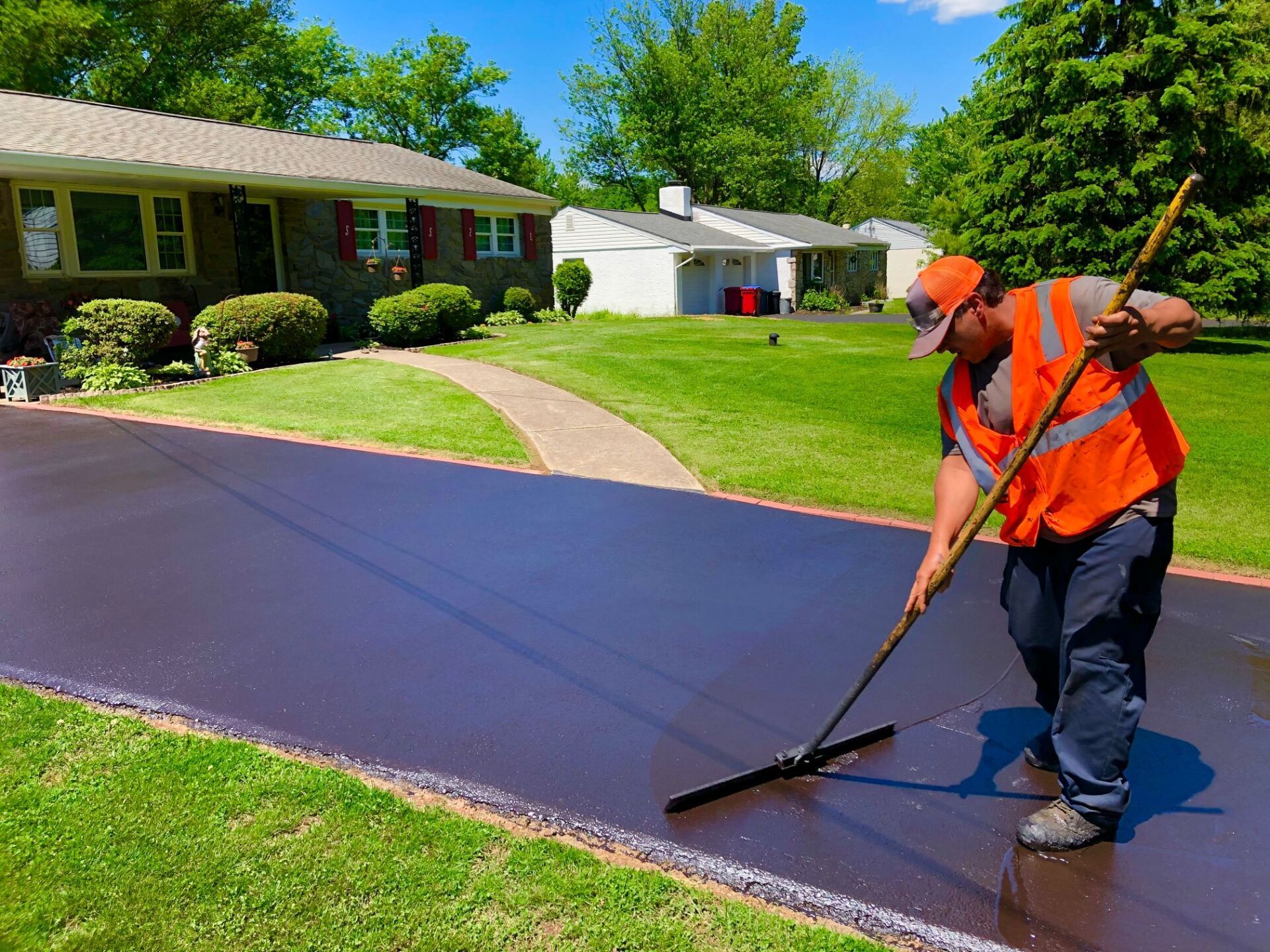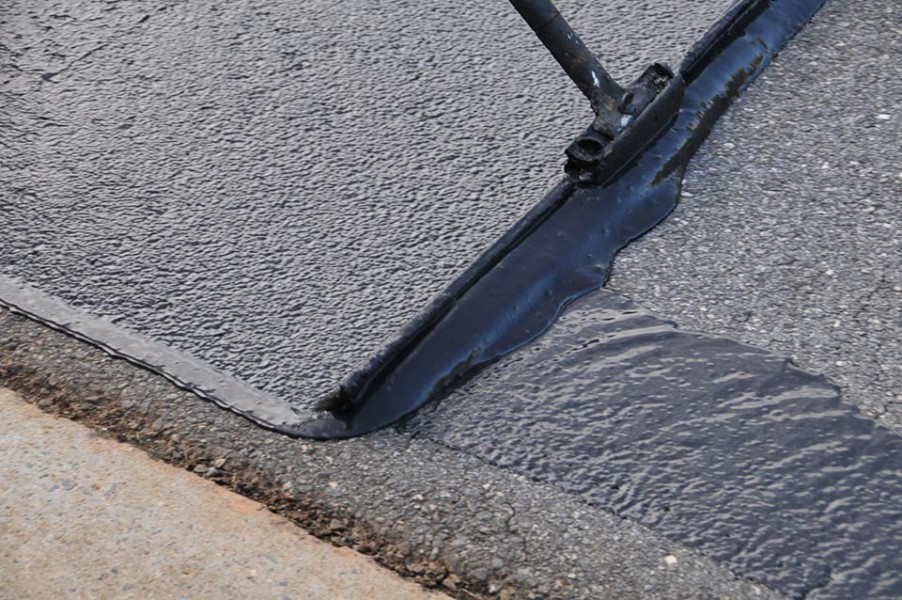Seal in Quality: Expert Solutions for Asphalt Repair and Sealing
Seal in Quality: Expert Solutions for Asphalt Repair and Sealing
Blog Article
Cold Mix Asphalt Vs. Hot Mix Asphalt: Which Is Right for You?

Structure Distinctions
Cold mix and hot mix asphalts differ dramatically in their composition, with unique features that influence their performance and applications. Cold mix asphalt is created by emulsifying the asphalt binder with water and an emulsifying agent prior to mixing it with accumulation. This technique permits the asphalt to be convenient at reduced temperatures, making it perfect for short-lived repair services and for use in colder weather. Warm mix asphalt, on the various other hand, is made at heats, commonly in between 300-350 ° F, which assists to achieve far better compaction and a much more durable last item. The hot mix asphalt manufacturing procedure includes warming the accumulation and asphalt binder individually prior to integrating them at the asphalt plant.
Moreover, cool mix asphalt often tends to be less thick and extra flexible than hot mix asphalt. This flexibility makes it far better suited for locations with higher levels of activity, such as driveways or roadways with heavy website traffic. In contrast, warm mix asphalt is known for its high toughness and resistance to rutting and cracking, making it a preferred selection for highways and high-traffic roadways where durability is crucial.
Setup Refine Differences
The process of installing cold mix and hot mix asphalt exhibits remarkable variations in their requirements and treatments. In comparison, hot mix asphalt requires a more fancy setup procedure. Due to the heating requirements, hot mix asphalt installations are generally lugged out by professionals with customized tools, making certain a much more permanent and structurally sound outcome.
Durability and Durability Variables
When considering asphalt choices, sturdiness and long life are vital elements to examine for lasting sidewalk performance. Hot mix asphalt (HMA) is recognized for its outstanding toughness and longevity. The high temperatures during the blending and laying process enable for far better compaction, causing a denser and more powerful pavement structure. This results in HMA being much more immune to rush hour loads, severe climate problems, and the impacts of aging compared to chilly mix asphalt (CMA)
In terms of longevity, HMA generally outperforms CMA due to its remarkable strength and resistance residential or commercial properties. HMA sidewalks have a longer solution life, requiring less constant repairs and maintenance, Visit Website which can equate to cost savings in the long run. In addition, HMA pavements are extra conveniently customizable to fulfill certain job needs, further improving their toughness.
Expense Considerations
Considering the monetary implications is an important facet when examining the selection between warm mix asphalt (HMA) and cool mix asphalt (CMA) for pavement projects. While the preliminary expense of hot mix asphalt is typically greater than that of cold mix asphalt, HMA frequently offers an extra economical service in the lengthy run due to its exceptional toughness and durability. HMA is recognized for its ability to withstand rush hour tons and severe climate condition, minimizing the demand for constant repairs and maintenance. On the other hand, cool mix asphalt is a lot more affordable in advance however may require even more frequent patching and resurfacing, bring about greater maintenance prices over time.
In enhancement to material costs, it's necessary to take into consideration the expenses linked with installation and upkeep when contrasting HMA and CMA. Inevitably, the decision in between HMA and CMA ought to take into account not simply the first cost but likewise the long-term financial ramifications to establish the most cost-effective choice for the particular pavement task.
Environmental Influence Contrast
Comparison of the environmental influences between warm mix asphalt (HMA) and cool mix asphalt (CMA) reveals distinct differences in sustainability methods. HMA manufacturing needs heats, resulting in enhanced power consumption and greenhouse gas exhausts. The procedure additionally releases unstable my review here organic substances (VOCs) and dangerous air toxins (HAPs) into the environment. In comparison, CMA is produced and used at reduced temperature levels, lowering energy usage and emissions considerably. The lower manufacturing temperature levels of CMA result in decreased fuel intake and lower levels of carbon dioxide exhausts, making it an extra eco-friendly alternative.
Additionally, making use of CMA usually includes reusing existing asphalt pavement, promoting source preservation and lowering the amount of waste sent out to garbage dumps. This recycling facet better boosts the sustainability of CMA contrasted to HMA. Generally, when thinking about the environmental influence, CMA becomes an extra ecologically sustainable option due to its reduced energy demands, reduced exhausts, and the possibility for reusing existing materials. By choosing CMA over HMA, road building jobs can add positively to ecological conservation efforts.
Verdict
Finally, the choice between cold mix asphalt (CMA) and warm mix asphalt (HMA) depends on different variables such as composition, setup procedure, sturdiness, durability, price, and environmental effect. angle parking. While CMA uses a fast and cost-effective option for minor fixings, HMA guarantees exceptional longevity and long life for rush hour locations. Take into consideration these variables thoroughly to determine which kind of asphalt is the ideal option for your paving requires

Considering the economic effects is an important facet when examining the selection in between hot mix asphalt (HMA) and cold mix asphalt (CMA) for sidewalk tasks. While the preliminary cost of hot mix asphalt is normally greater than that of cool mix asphalt, HMA find this commonly provides a much more economical option in the lengthy run due to its exceptional resilience and durability. asphalt repair.Comparison of the ecological effects between warm mix asphalt (HMA) and chilly mix asphalt (CMA) reveals distinctive distinctions in sustainability methods.In verdict, the selection between chilly mix asphalt (CMA) and warm mix asphalt (HMA) depends on various factors such as composition, installment procedure, sturdiness, long life, expense, and ecological effect
Report this page